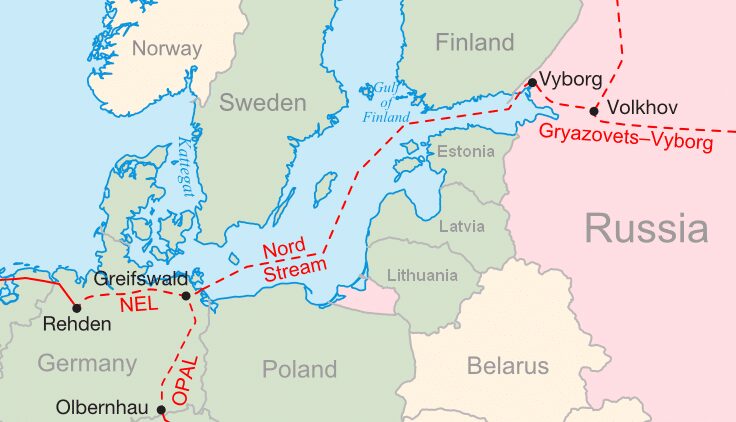The EU stated that sabotage was the cause of two major gas pipeline (Nord Stream) leaks from Russia to Europe, but refrained from directly accusing Russia.

The head of the European Commission, Ursula von der Leyen, stated that intentional disruption would be met with the “strongest possible response.”
Previously, the EU has accused Russia of using gas supplies as a weapon against the West in retaliation for its support for Ukraine.
However, Kremlin spokesman Dmitry Peskov dismissed sabotage allegations as “predictable, stupid, and ridiculous.”
Secretary of State of the United States Antony Blinken stated that he did not believe the leaks would have a significant impact on Europe’s energy resilience. Neither pipeline is currently transporting gas, although both contain gas.
Mr. Blinken did not accuse Russia directly but stated that it would be in “nobody’s interest” if they were caused intentionally, the Danish Energy Minister, Dan Jorgensen, estimated that the gas leaks would continue for at least a week, or until the escaping gas ran out. An inquiry has been initiated.
On Monday afternoon, the operators of Nord Stream 2 reported a loss of pressure in the pipeline. This prompted Danish authorities to advise vessels to avoid the area close to the island of Bornholm.

The operator of Nord Stream 1 announced on Tuesday that the undersea lines had simultaneously sustained “unprecedented” damage in a single day.
The Nord Stream 1 pipeline, which consists of two parallel branches, has not transported gas since Russia shut it down in August, citing maintenance requirements.
It spans 1,200 kilometers (745 miles) beneath the Baltic Sea, from the Russian coast near St. Petersburg to northeastern Germany. The Nord Stream 2 pipeline was halted after the Russian invasion of Ukraine in February.
Senior research fellow at the independent Oxford Institute for Energy Studies Mike Fulwood told the BBC that sabotage was the most likely cause of the leaks.
“The rupture of an offshore pipeline is a rare event, so three ruptures in 18 hours would be a remarkable coincidence,” he said.
If Russia was responsible for the sabotage, this was a “bizarre” move, he said because it had already cut off supplies.
As the damaged sections would need to be replaced, he estimated that repairs could take between three and six months. In the past, similar damage to a different pipeline took nine months to repair.
Dmitry Peskov stated that he was “extremely worried” about the leaks and that an intentional attack could not be ruled out.

Seismologists reported underwater explosions prior to the appearance of the leaks. The Danish Defense Command has released footage of bubbles on the surface of the Baltic Sea, the largest measuring 1 km (0.6 miles) in diameter.
There is no doubt that these were explosions, according to Bjorn Lund of the National Seismology Centre of Sweden.
Greenpeace expressed concern over the leaks, stating that they could have the same negative environmental impact as 30 million tonnes of carbon dioxide.
However, according to the German environment ministry, the leaks pose no significant threat to marine life.













